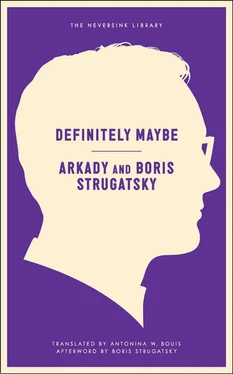“Throw it all in the incinerator,” I said, barely able to talk. “Weingarten’s revertase, and the Cultural Exchange, and this.” I pushed the envelope toward him across the smooth tabletop. “Throw it all away and concentrate on your own work.”
Vecherovsky looked at me in silence through his powerful lenses, blinking with his singed lashes, then knitted the remains of his brows and stared into his cup.
“You are a top-notch specialist,” I said. “You’re the best in Europe!”
Vecherovsky was silent.
“You have your work!” I shouted, feeling my throat constrict. “Work! Work, goddamn you! Why did you have to get mixed up with us?”
Vecherovsky gave a long, deep sigh, turned sideways to me, and leaned his head and back on the wall.
“So, you misunderstood,” he said slowly, and there was an unusual and totally out-of-place smugness and satisfaction in his voice. “My work…” Without moving, he squinted an eye in my direction. “They’ve been after me for two weeks because of my work. You have nothing to do with it, my little lambs. You must admit that I have remarkable self-control.”
“Drop dead,” I said, and stood up to leave.
“Sit down!” I sat.
“Pour the cognac in the coffee!” I poured.
“Drink.” I drained the cup, tasting nothing.
“You actor,” I said. “There’s a lot of Weingarten in you sometimes.”
“Yes, there is. And of you, and Zakhar, and Glukhov. There’s more of Glukhov in me than of anyone else.” He carefully poured some more coffee. “Glukhov. The desire for a quiet life, for irresponsibility. Let’s become the grass and the bushes, let’s become water and flowers. I’m probably irritating you?”
“Yes.”
He nodded: “That’s only natural. But there’s nothing you can do. I want to explain to you what’s going on. You seem to think that I’m going to face a tank empty-handed. Nothing of the sort. We are dealing with the laws of nature. It’s stupid to fight the laws of nature. It’s shameful to capitulate before them and, in the long run, stupid, too. The laws of nature must be studied and then put to use. That’s the only possible approach. And that’s what I plan to do.”
“I don’t understand.”
“You will in a minute. This law did not manifest itself before our time. To put it more accurately, we had never heard of it. Though it may be no accident that Newton got caught up in interpreting the Apocalypse and Archimedes was cut down by a drunken soldier. Anyway, those are random thoughts. The problem is that the law manifests itself in only one way—through unbearable pressure. Pressure that threatens your mind and even your life. But nothing can be done here. After all, that’s not unique in the history of science. There was the same danger in researching radioactivity, defusing storms, in the theory that there are many inhabited worlds. Perhaps with time we will learn to channel this pressure into harmless areas, and maybe even to harness it for our own goals. But there’s nothing you can do now, the risk must be taken—I repeat, not for the first and not for the last time in the history of science. I want you to understand that there is basically nothing new or unusual in this situation.”
“Why do I have to understand that?” I asked grimly.
“I don’t know. Maybe it’ll make it easier for you. And then I would like you to know that this isn’t for a day or for a year. I think that it may be for more than a century. There’s no hurry,” he snorted. “There’s a billion years to go. But we can and must start now. And you… well, you’ll have to wait. Until Bobchik grows up. Until you get used to the idea. Ten years, twenty—it doesn’t matter.”
“It does, and how!” I said, feeling a disgusting crooked smirk on my face. “In ten years I won’t be good for anything. And in twenty I won’t give a damn about anything.”
He didn’t say anything; he shrugged and filled his pipe. We sat in silence. He was trying to help me. Paint some prospects for me, prove that I wasn’t such a coward and that he wasn’t such a hero. That we were just two scientists; we were offered a project, and due to circumstances, he could work on it now and I couldn’t. But it didn’t make it any easier for me. Because he was going to the Pamirs to struggle with Weingarten’s revertase, Zakhar’s fadings, with his own brilliant math, and all the rest. They would be aiming balls of fire at him, sending ghosts, frozen mountain climbers, especially female ones, dropping avalanches on him, tossing him in space and time, and they would finally get to him there. Or maybe not. Maybe he would determine the laws of the manifestations of fire and the invasions of frozen mountain climbers. And maybe none of this would happen. Maybe he’d just sit and pore over the work and try to discover the point of intersection of the theory of M cavities and the qualitative analysis of American cultural influence on Japan, and probably that will be a very strange point of intersection, and it’s also probable that he will find the key to the whole vicious mechanism in that point, and maybe even the key to controlling the mechanism. And I will stay home, meet my mother-in-law and Bobchik at the plane tomorrow, and we’ll all go out and buy the bookshelves together.
“They’ll kill you there,” I said hopelessly.
“Not necessarily,” he said. “And after all, I won’t be there alone… and not only there… and not only me.”
We looked into each other’s eyes. Behind the thick lenses there was no tension, no false fearlessness, no flaming martyrdom—only the reddish calmness and reddish confidence that everything should be just the way it was and no other way.
And he said nothing else, but I felt that he was still speaking. There’s no hurry, he was saying. There’s still a billion years to the end of the world, he was saying. There’s a lot, an awful lot, that can be done in a billion years if we don’t give up and we understand, understand and don’t give up. And I also thought that he said: “He knew how to scribble on paper under the candle’s crackle! He had something to die for by the Black River.” And his satisfied guffaws, like Wells’s Martian laughter, rang in my ears.
I lowered my eyes. I sat hunched up, clutching the white envelope to my stomach with both hands and repeated for the tenth time, the twentieth time: “Since then crooked, roundabout, godforsaken paths stretch out before me…”
A NOTE FROM THE TRANSLATOR
Arkady and Boris Strugatsky are Russia’s best-known science fiction writers. Intellectually invigorating, full of adventure, and set in fantasy worlds, their work was powerful social criticism that could be expressed only indirectly under Soviet censorship. Even so, they had to deal with censors for every publication. The brothers lived in different cities, Arkady in Moscow, Boris in Leningrad, and in those pre-Internet days, they met in person to work on their books, see publishers, and try to persuade editors to leave in concepts, phrases, even individual “suspect” words.
The collapse of the USSR brought an end to state censorship, and many new editions of the Strugatskys’ previously expurgated works appeared. The canonic texts, edited and annotated by Boris Strugatsky, were published in 2000–2001. This edition of Definitely Maybe is based on those publications, and it is the first time the complete text has been available in English.
In this afterword, Strugatsky tells the backstory to Definitely Maybe (which was called A Billion Years Before the End of the World in Russian), and discusses the writing process from proposal to text, the delay caused by a political-literary case in which Boris was a witness, and the book’s eventual publication. Boris refers to Arkady as AN and himself as BN; the “N” stands for Natanovich, their patronymic.
Читать дальше












